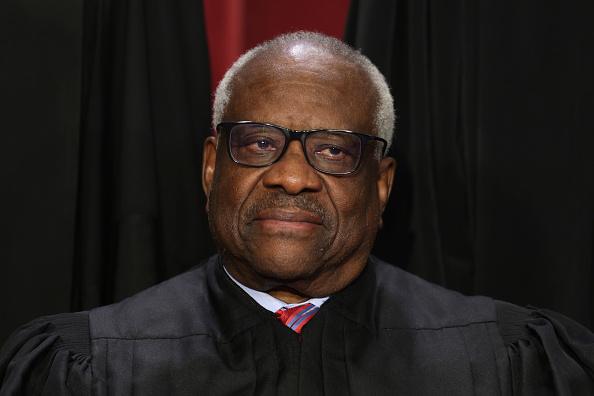Clarence Thomas has 30 days to resign if he wants millions from John Oliver

U.S. Supreme Court Justice Clarence Thomas poses for an official portrait in the Supreme Court building Oct. 7, 2022, in Washington, D.C. Photo by Alex Wong/Getty Images.
When it comes to Supreme Court reform, John Oliver is tired of just talking about term limits and ethics codes. Instead, the late-night talk show host said he’s taking a page out of the playbook used by the rich and powerful, who the comedian said routinely lavish gifts on public servants to curry favor.
“If we’re going to keep the bar of accountability this low, perhaps it’s time to exploit that low bar the same way billionaires have successfully done for decades,” Oliver said on Sunday’s episode of HBO’s “Last Week Tonight,” before announcing the offer he had for Supreme Court Justice Clarence Thomas: $1 million per year if he steps down from his post immediately.
Oliver is also throwing in a brand new, $2.4 million motor coach that’s outfitted with a king-size bed, four televisions and a fireplace—a potential deal sweetener for Thomas, who has come under fire for receiving significant gifts and favors from a network of wealthy friends and patrons.
Oliver’s “somehow legal” proposal—at least, according to the experts he consulted, Oliver said—was made at the end of a segment devoted to the highest court in the land. The Supreme Court, Oliver argued, had reached a “breaking point” following a string of scandals involving the patronage of right-wing billionaires—many of whom, the comedian pointed out, have a stake in some of the cases brought before the court.
“In their confirmation hearings, they pretend to have no idea how they’ll rule on hot-button issues, and we all have to pretend to believe them before we appoint them to a job that they can hold until they die,” Oliver said. “We don’t treat them like what they are, which is people who can be motivated by ideology and greed like anybody else.”
A spokesperson for the Supreme Court did not respond Monday to a request for comment from The Washington Post.
Oliver’s segment came at a time in which public confidence in the Supreme Court has sunk to record lows.
A poll last year by Gallup found that only 9 percent of Americans have a “great deal” of trust and confidence in the “judicial branch of government, headed by the U.S. Supreme Court.” The poll also showed that 58 percent of Americans “disapprove” of the way the Supreme Court is handling its job—the highest disapproval rating for the court since Gallup began tracking in 2000.
“Going forward, concerns about Supreme Court justices’ acceptance of gifts and lavish trips, particularly among two conservative justices, may subdue the public’s approval of and trust in the nation’s highest court,” Gallup concluded, referring to the controversies surrounding Thomas and Justice Samuel A. Alito Jr.
Oliver mentioned that Alito had failed to disclose his luxury fishing vacation in Alaska with a wealthy hedge fund executive—which reportedly included dinners of king crab legs and wine worth $1,000 a bottle, according to an investigation by ProPublica—but the bulk of his show centered on Thomas.
Oliver delved into the controversies Thomas has faced in his more than three decades on the high court, including failing to disclose lavish trips with Harlan Crow—a Dallas-based real estate investor and a major Republican donor—and his wife’s texts urging Donald Trump’s White House chief of staff to overturn the 2020 election. The comedian also noted that Thomas has not recused himself from cases in which there is an apparent conflict of interest or in which he may have received gifts from special-interest groups.
“It’s not that these billionaires paid Thomas to change his views, it’s that they like his views so they’re paying for him not to leave, which is different, but not better,” Oliver said.
Thomas has denied wrongdoing and said he was advised that he did not need to disclose trips and gifts from wealthy donors, who are some of his “dearest friends.”
“Early in my tenure at the court, I sought guidance from my colleagues and others in the judiciary, and was advised that this sort of personal hospitality from close personal friends, who did not have business before the court, was not reportable,” Thomas said in a statement in April, The Post previously reported.
In the wake of deep scrutiny, the Supreme Court announced in November that it had adopted a new code of conduct, but that it did not have a way to enforce those standards against those who fall short.
It was for that reason that Oliver decided it was time to put his own pocket on the line. And if $1 million a year until either of the men die is not enough, Oliver said, then taking the deal is probably “the perfect way to find out who your real friends actually are.”
“That’s the beauty of friendship, Clarence,” Oliver said, standing next to the state-of-the-art motor coach he is offering the justice. “If they’re real friends, they’ll love you no matter what your job is.”
But, Oliver warned, his offer expires in 30 days.
“Let’s do this!” he screamed, throwing a wad of dollar bills into the air to cheers from the audience.
As the money floated down around him like confetti, Oliver asked the million-dollar question: “How is this legal?”



